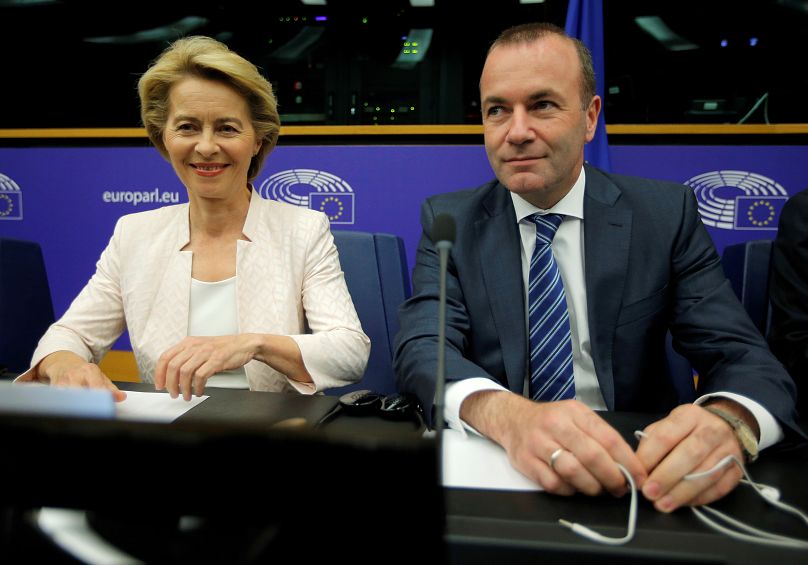Hint: The answer is no.
Controversy is swirling around the creation of a new EU Commission portfolio to "Protect our European way of life".
Margaritis Schinas has been nominated for the post and, if confirmed, he will steer the bloc's policy-making on migration and security as well as education and employment.
But MEPs have criticised it for making a link between migration and protecting Europe's way of life, saying it panders to the far-right.
The leader of the Liberal bloc in the European Parliament, Guy Verhofstadt, was one of the first to publicly say the wording made him uncomfortable.
Then, French MEP asked for lawmakers in parliament to send a letter to Von der Leyen in support of changing the name.
"What is completely unacceptable is that this name, which makes a link between immigration and protecting a European way of life, is the direct validation of the words of the far-right for whom immigrants are barbarians who threaten our way of life," Delli told Euronews.
"We cannot use the same semantics as people who oppose our European values. Ms Von der Leyen cannot launch this new Commission by making pledges to Eurosceptics who aspire only for a European recoil and a stunted Europe."
She said MEPs voted in favour of her proposal to send a letter on Wednesday.
A day later, outgoing European Commission President Jean-Claude Juncker reacted to the controversy in an interview with Euronews.
He said he did not agree with the portfolio title and did not think the name corresponded to Schinas' own values.
Juncker said that for him, the "European Way of life" meant putting together main talents and energies, and respect for others independently from their colour and their home states.
But is Von der Leyen the first one to use the phrase?
No, in fact, the leader of the European People's Party (EPP) in the European Parliament Manfred Weber has used the phrase "very often in the past two years," an EPP spokesperson told Euronews.
The spokesperson said that for Weber, "the European Way of Life" makes reference to the values European societies are based on and which should be defended, meaning:
"The fundamental freedoms, democracy, the rule of law, freedom of the press, the ban on the death penalty, the social market economy, which balances the economy with a high standard of social rights, equality of men and women," said a statement from the EPP.
"All these values our societies have in common, which come from our history, from Judeo-Christian values, but also from the philosophical tradition and the great thinkers of the Enlightenment. They make the European Way of Life so different from the rest of the world."
In an interview with Germany's Der Spiegel, Weber said the "European Way of Life" was a principle that united all Europeans.
"There is such a thing as a European way of life. It describes our foundation, the values and rules that nobody questions [...] All of those things are seen essentially the same way in Sweden as they are in the Czech Republic," he said.
Weber used the phrase two years ago during a debate in plenary on the State of the Union. He said: "Today, it is about the self-assertion of this continent. Today, we must defend Europe’s identity. Today, we must defend the European way of life in a world that is changing rapidly."
Like von der Leyen, Weber linked the phrase with migration, saying the "European Way of Life" was to help people in need but to also protect borders against illegal immigrants and human traffickers.
In her mission letter to Schinas, von der Leyen said that "protecting our European way of life highlights the need for well-managed legal migration, a strong focus on integration and ensuring our communities are cohesive and close-knit".
"The European way of life is built around solidarity, peace of mind and security. We must address and allay legitimate fears and concerns about the impact of irregular migration on our economy and society. This will require us to work together to find common solutions which are grounded in our values and our responsibilities. We must also work more closely together on security, notably on new and emerging threats that cut across borders and policies," it continued.
Not the first time Von der Leyen used the phrase either
Tuesday was not the first time, von der Leyen used the term. In fact, it featured prominently in her "Political Guidelines for the next Commission" released in July, which strive to protect Europe's values (of solidarity, being a safe haven for refugees, with welfare systems and integration policies that protect the most vulnerable in our societies, and a place that empowers its citizens and protects them from security threats).
"Read the European treaties"
In a press briefing on Thursday, spokesperson for the European Commission Mina Andreeva said the "European Way of Life" was based on article 2 of the Treaty of Lisbon, which reads:
"The Union is founded on the values of respect for human dignity, freedom, democracy, equality, the rule of law and respect for human rights, including the rights of persons belonging to minorities. These values are common to the Member States in a society in which pluralism, non-discrimination, tolerance, justice, solidarity and equality between women and men prevail."
Von der Leyen responded to the criticism on the portfolio's name by tweeting Article 2.
Andreeva said the portfolio's name had not been changed.












